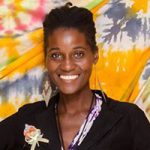CHAIRMAN of the Board of Governors of the Government Technical Institute (GTI), Vincent Alexander, is optimistic that the institution’s ‘Trade of Trades’ exhibition will become an annual feature on its calendar of events bringing industries, students and businesses together to create a window of opportunities for all involved.
Speaking at the opening ceremony for the trade exhibition on the lawns of the campus located at Camp Street and Woolford Avenue, Georgetown, on Wednesday, Alexander said the trade fair “provides an opportunity to demonstrate our linkages – our forward linkages, our backward linkages, our lateral linkages, our linkages with industry, our linkage with tertiary and higher education, our linkage with secondary education.”
He called it a moment of pride and joy for students whose works were exhibited, as they were given the opportunity to demonstrate their skills to the wider community. He said too that it was a proud moment for secondary school students who were provided with the opportunity to observe the things taught at the institution.
“So they could start to cast their minds and cast their eyes beyond GTI and into the future in terms of what career path and what full development path they would wish to follow,” said Alexander, who also is Technical Advisor to Minister of Education, Dr Rupert Roopnaraine.
Participating external industries also have been given the opportunity to attract students’ attention, motivating decisions which will positively affect their future, Alexander stated.
GTI has altered their day and pushed the theme of ‘fuelling the future’ with the hosting of the grand exhibition displaying the skills of students, and other exhibitors, even as students of other institutions and other visitors streamed into the compound for a peek at the works of craft and creativity.

Various departments of the institution – Land Surveying, Computer Science, Electrical Engineering, Building, Business, Mechanical Engineering and Science – showcased several projects including their amazing metal creations and how they were done.
Assistant Chief Education Officer within the Ministry of Education, Patrick Chinedu, said the future of the institution and its students can only be fuelled through a collective effort by the Ministry of Education, Technical Vocational Education Training (TVET) council, all TVET institutions and the private sector.
He said GTI and like institutions play critical roles in human and national development, since the improvement of human education and skill is imperative for the country’s economic development.
“… Hence, a prudent education system assigns priority to human development in its policy formulation and ensures availability of appropriate funding for this purpose.”
Chinedu said his ministry’s Strategic Plan places emphasis on human development, of which one of the components is Technical Vocational Education and Training (TVET), which now gains tremendous popularity in recent literature.
“The literature refers this subject to education and training that prepares people for an employment and makes them more productive in various economic fields. The significance of human development cannot be denied as it is directly linked with the economic growth as it exhibits threshold effects in the sense that nations must attain a certain human development level before future economic growth becomes sustainable,” Chinedu said.
He said in order to achieve greater development, technical institutions and training centres “must have the preferred machinery and equipment for training the skilled workers. The class supervisors must completely handle the production machinery to produce quality goods with higher efficiency. The teaching staff should be familiar with the practical knowledge of the factories and there should be an in-service training programme as well.”

Considering changes in the production techniques and introduction of new technology, there should be expert curriculum development and reviews.
Meanwhile, GTI Principal,Renita Crandon-Duncan, congratulated the students and staff for the “amazing projects” on display.
She said the ‘Trade of Trades’ exhibition creates linkages between GTI and other institutions and its skills trade showcased will inspire students of primary and secondary schools.
“Our projects will reflect future programmes of the institutions and innovations of staff and students. These projects are future-based and they demonstrate the importance of science and technology, not only to Technical Vocational Education Training, but to the development of the economy,” she said.
The institution’s consideration of the green initiative also demonstrates the future of it producing and protection of the environment in its work.
“What you will witness today is an exemplification of that theme – what future plans GTI has for driving our economy and realising our vision to produce all-round, skilful graduates who will ensure that Guyana takes her rightful place in the global village,” Duncan said.



.jpg)








